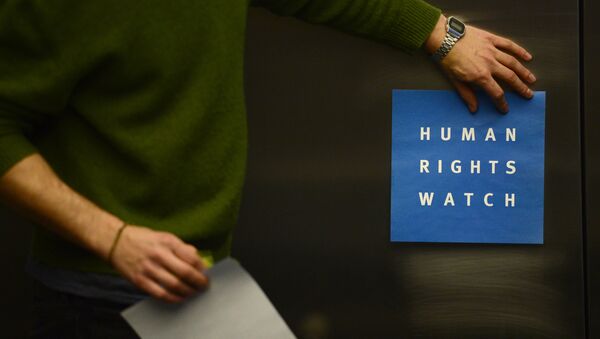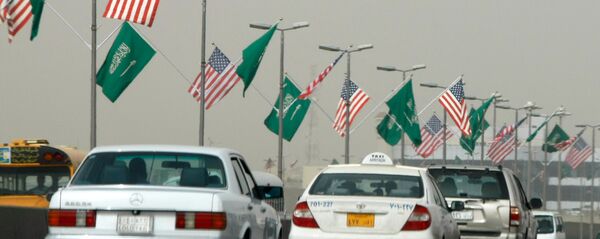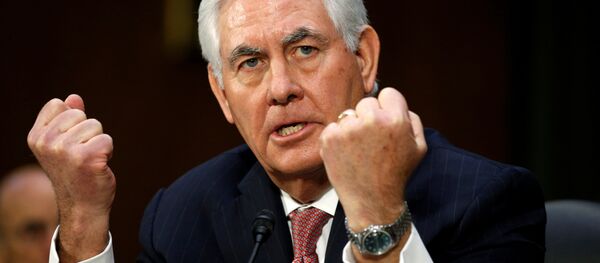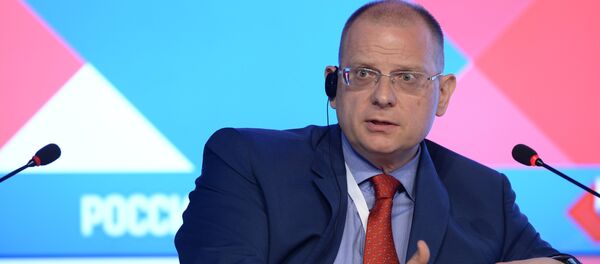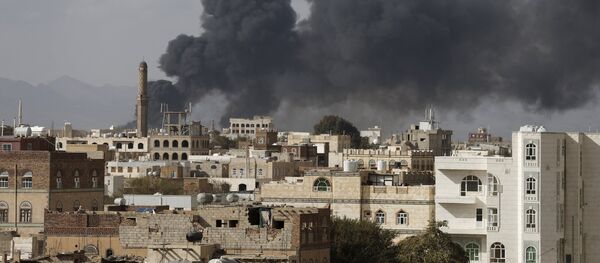The US administration, under President Donald Trump, focused on fixing mostly internal policy, while the United Kingdom became entangled in general election campaign and negotiations over its departure from the European Union.
"With the United States led by a president who displays a disturbing fondness for rights-trampling strongmen, and the United Kingdom preoccupied by Brexit, two traditional if flawed defenders of human rights globally are often missing in action," the report read.
However, some other countries, such as France or the Netherlands, were able to step up, in their reaction to populist politicians or actions on the international arena.
US After Trump
Trump assumed the office of the US president in 2017 and many of the new policies, in particular, the new administration’s stance on curbing the immigration, faced public criticism.
"Trump won the presidency with a campaign of hatred against Mexican immigrants, Muslim refugees, and other racial and ethnic minorities, and an evident disdain for women. A powerful response came from civic groups, journalists, lawyers, judges, many members of the public, and sometimes even elected members of Trump’s own party," the HRW report read.
Another migration-related issue that caused heated debates in the United States was the Deferred Action for Childhood Arrival policy, rescinded by the new administration. The program allowed migrants who arrived in the United States as children to apply for a two-year deferral from deportation, during which they could legally work. The rescission has been challenged in court by several US states and other entities. On January 9, the US District Court for the Northern District of California suspended the recall of the program.
"The resistance limited the harm that might have been done, most notably his [Trump’s] efforts to discriminate against Muslims seeking to visit or obtain asylum in the United States, to undermine the right to health care in the US, to expel transgender people from the military, and even, in some cases, to deport long-term resident immigrants," the HRW report noted.
Several other internal rights issues in the United States, listed in the report, included racial disparity, poverty, harsh criminal sentencing, disability, sexual orientation, gender identity and women’s rights.
"Secretary of State Rex Tillerson largely rejected the promotion of human rights as an element of US foreign policy while more broadly reducing the role of the US abroad by presiding over an unprecedented dismantling of the State Department. He refused to fill many senior posts, dismissed several veteran diplomats, slashed the budget, and let the department drift," the report said.
Some of the policies appeared to actively abuse human rights principles rather than simply quietly avoid the topic. For example, the HRW stated that the United States was keeping Guantanamo prison Bay open and allegedly interrogating detainees in undercover jails managed by foreigners in Yemen.
UK Taking Step Back
The United Kingdom began negotiations on its departure from the European Union in 2017, which clearly became one of the central issues for the country itself. Besides, the imminent exit raised concerns about the rights of EU citizens in the United Kingdom and vice versa as well as about the recent UK legislation initiatives.
"A draft law to move EU law into domestic law after Brexit raised serious concerns about granting broad powers to the executive to amend laws undermining rights without parliamentary scrutiny, and excluding rights currently protected under the EU Charter of Fundamental Rights," the report said.
"The UK was largely silent about the wider human rights crisis in Egypt," the report added.
On the other hand, the United Kingdom, alongside the United States and the European Union provided financial assistance to the Gambia, where a new president, Adama Barrow, was elected in 2017. London has made its contribution to help Lebanon, struggling to host Syrian refugees.
France Resists Populist Choice
French presidential election, where centrist pro-EU candidate Emmanuel Macron of Le Republique en Marche was facing right-wing Euroskeptic Marine Le Pen from National Front, faced increased international attention, as populist policies appeared to be gaining traction in Europe. The HRW decried the fact that such policies were increasingly adopted by center-right and right-wing parties hoping to "pre-empt the populists’ appeal" but only promoting their message instead.
"Emmanuel Macron took a different approach during his presidential campaign. He openly embraced democratic principles, firmly rejecting the National Front’s efforts to foment hatred against Muslims and immigrants. His resulting victory and his party’s success in parliamentary elections showed that French voters overwhelmingly reject the National Front’s divisive policies," the HRW said in its report.
The watchdog decided to launch its annual report in Paris because the French presidential election in 2017 provided a "turning point" against the spread of populism.
"Despite widespread concern from rights bodies, both domestically and abroad, the law incorporates some of the powers utilized under the state of emergency. These include powers that have led to significant abuse, such as the power to order people considered a threat to national security to live in an assigned place of residency, and to carry out house searches without judicial authorization," the report said.
The HRW praised Macron for standing up to Russia, Turkey, and Venezuela, but noted the lack of vigorous opposition to abuses in China, Egypt, and Saudi Arabia.
Fear of Migrants, Muslims Rising in EU
France may have rejected Le Pen’s pledge to restrict migration, but the influx of migrants and related issues are far from being solved in the country and across Europe.
"Xenophobic populists hostile to human rights shaped politics even when they failed to win at the ballot box, and European governments seemed determined to keep migrants away at all costs," the HRW said.
The report pointed to the EU states’ increased efforts to reduce the number of arrivals and transfer the responsibility for refugees to non-EU states, such as Libya.
Inside the European Union, there were some troubling signs as well, such as the apparent rise in hate crimes
"Racist, xenophobic, and anti-Muslim sentiment and violence persisted across the EU. Muslims experienced widespread hostility and intolerance. Anti-Semitism, including hate crimes, remained a serious concern," the report said.
Opportunity For China, Russia
China and Russia attempted to internationally promote anti-rights policies, according to the report.
"While focused on quelling any possibility of domestic mass protest against slowing economies and widespread official corruption, Presidents Xi Jinping and Vladimir Putin have aggressively asserted an anti-rights agenda in multinational forums and forged stronger alliances with repressive governments," the report said.
Russia was criticized for its opposition to UN Security Council’s resolutions against the Syrian government, despite Moscow's continued efforts to promote political settlement through negotiations and desire to ensure that the Syrians decide the future of the country themselves.
"In the case of Syria, Russia’s repeated vetoes and veto threats at the UN Security Council, sometimes joined by China, barred the only immediately available route to the International Criminal Court. Despite a growing international effort to discourage use of the veto in situations of mass atrocities, Russia and China, as well as the United States, have not signed on to these initiatives," the HRW said.
Mikhail Fedotov, the chair of the Council for Civil Society and Human Rights, said back in October that a preliminary investigation into the alleged persecution of LGBTQ men in Chechnya was underway. Chechen President Ramzan Kadyrov has refuted media reports on the issue.
China was lambasted for "the broad and sustained offensive on human rights … [which] showed no sign of abating in 2017," in particular its online censorship, harassment faced by the opposition in Hong Kong and Xinjiang Uygur Autonomous Region.
War-Torn Yemen
Yemen ravaged by the civil conflict remained at the center of international attention throughout 2017, but despite the widespread effort to help the civilian population, the situation on the ground remains dire.
The HRW report stressed the plight of the civilian population, caught in the middle of the violent clashes between the two sides.
"The coalition has conducted scores of indiscriminate and disproportionate airstrikes hitting civilian objects that have killed thousands of civilians in violation of the laws of war, with munitions that the US, United Kingdom, and others still supply. Houthi-Saleh forces have fired artillery indiscriminately into cities such as Taizz and Aden, killing civilians, and launched rockets into southern Saudi Arabia," the report said.
According to the HRW, an independent international investigation of abuses in Yemen was met with little support from some countries traditionally promoting human rights issues, but eventually found its champions.
"The idea of an investigation received at best lukewarm support from the United States, the United Kingdom, and France, all major sellers of arms to Saudi Arabia. None was eager to take a public stand. In that void, the Netherlands stepped in and took the lead, ultimately joined by Canada, Belgium, Ireland, and Luxembourg," the report said.
Syria's Seventh Year at War
Meanwhile, Syria has been struggling to end conflict between the government and opposition since 2011. The situation has been aggravated by the terrorist attacks, with Damascus and opposition both focusing on fighting this threat in 2017.
The HRW stressed that all parties to the Syrian conflict had abused human rights. The watchdog accused the Syrian government of using chemical weapons against the civilians in opposition-controlled areas as well as of torture and poor treatment of detainees.
"Non-state armed groups have also committed a host of violations. The groups have launched deliberate and indiscriminate attacks against civilians, abducted, and arbitrarily detained activists, used excessive force to stifle protests and interfered with humanitarian aid delivery," the report added.
"The April strike was not accompanied by a clear strategy for continued engagement in Syria," the report concluded.
The watchdog noted that the peace talks in Geneva, backed by the United Nations, "failed to achieve momentum," while the negotiations in Astana, actively promoted by Russia, Iran and Turkey, helped decreased violence, but did not provide a lasting political solution.
Russia, who has actively participated in peace efforts, is currently preparing to host a new platform for the Syrian settlement, the Congress of the Syrian National Dialogue, expected to be held in Sochi in late January.
